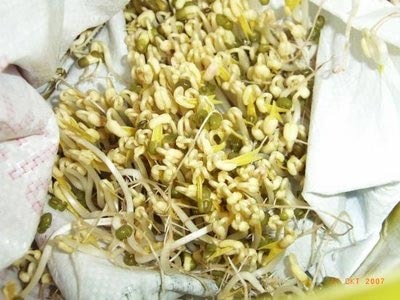Housewives are still careful with bean sprouts.
Although authorities have announced that bean sprouts in Hanoi are safe, many housewives are still wary of this food and choose to make it themselves to ensure safety.
Recently, the Plant Protection Department (PPD) announced the test results showing that bean sprouts in Hanoi are not contaminated with toxic substances, however, the above information does not reduce the worries of housewives about this food.
Bean sprouts are a favorite food of Vietnamese people, with cheap price and easy to prepare many delicious dishes. However, since the continuous information about bean sprouts being incubated with toxic chemicals to stimulate growth, this vegetable has completely "fallen out of favor" in the market. Because the incubation time of bean sprouts is quite long, production facilities want to shorten the time, they use chemicals to stimulate green beans to quickly burst the shell. The product is a type of bean sprouts with plump, white stems, without roots. If used in excess of the allowed dosage, toxic substances that stimulate white bean sprouts can cause many types of diseases, affect the liver, heart, kidneys and destroy the human body.
 |
Many housewives do not trust bean sprouts sold in the market, even after the recent results of the Plant Protection Department's non-toxic bean sprout inspection. Vegetable sellers all guarantee that their vegetables are clean, but when trust is gone, it is difficult to get consumers to return. Ms. Oanh (Hoang Mai, Hanoi) said that for the past two months, her family has not bought bean sprouts at the market because they are worried about buying bean sprouts contaminated with toxic chemicals. Mr. Thai (Nguyen Ngoc Nai, Hanoi) also shook his head at ready-made bean sprouts at the market because he thought that when the authorities took samples for testing, they might not detect toxicity, but at other times, if they were made by someone else, it would be impossible to control. Therefore, to be on the safe side, Mr. Thai has given up the habit of buying bean sprouts at the market.
And her solution is to invest in a bean sprout machine. With a not too expensive amount of money, Ms. Oanh can be somewhat assured about the clean bean sprouts made by her family. “Every time I go to the market to buy a few ounces of whole green beans, I can make a batch of bean sprouts to eat for the whole week. It only takes about 2 to 3 days to incubate the sprouts, I make them myself, pump the water myself, and pick the roots, so I can eat them with peace of mind and they are not as toxic as the chemically incubated sprouts at the market,” she shared.
Bean sprout machines like Ms. Oanh's cost between 400,000 and 700,000 VND on the market and have quickly become a safe choice for housewives. Besides, there are also many people who do not buy machines but try to make bean sprouts manually. Ms. Hong (60 years old, Nghia Tan collective housing area) shows her traditional way of making bean sprouts: "The simplest way is to soak bean sprouts for 12 hours, put them in a basket and cover them with a towel, and water them continuously to make a batch of delicious bean sprouts, ensuring food hygiene and safety."
While ready-made bean sprouts have become unsold in the markets, whole mung beans have become more popular. The owner of a dry goods store in Cau Giay market said that in the past few months, the number of regular customers who regularly buy whole mung beans to make bean sprouts at home has been increasing.
According to EVA -NM
